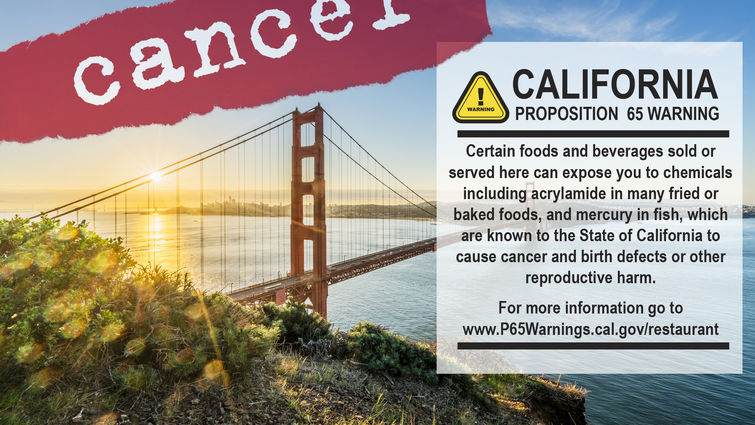
If you live in California, cancer warnings seem to be lurking around every corner — on grocery store shelves, at the gas pump or even in the window of your favorite coffee shop.
The Golden State’s cancer-warning policy comes from Proposition 65, a state law enacted in 1986, to protect California’s drinking water supply from carcinogens and toxic chemicals. It mandates that the state retain a master list and warn consumers in writing of all potentially toxic chemicals that have a more than 1 in 100,000 chance of increasing your risk of cancer.
New rules established last year require California businesses operating, selling or manufacturing products in California to “provide a clear and reasonable warning to consumers.” Caution labels must now include the name of at least one risky chemical present in any product that comes with a cancer warning. They must also add verbiage that direct consumers to the state’s website where additional information on toxic chemical exposure can be found.
Mark Reeves, MD, PhD, director of the Loma Linda University Cancer Center, says that although Proposition 65 cancer warnings have broadly increased awareness about what in our environment can cause cancer, the warnings largely don’t increase understanding of how to reduce one’s risk.
“There are no warning signs on the things we do every day that contribute more to cancer mortality than these specific chemicals,” Reeves says. “More than 50 percent of cancer deaths could be avoided if people didn't smoke, didn't drink alcohol, weren't obese and exercised regularly.”
Reeves advises consumers to consider these factors about cancer warnings:
- Desensitization to cancer warnings. There is a downside to being inundated with cancer warnings, Reeves says. Frequent, non-specific signage has led some consumers to tune warnings out, thus decreasing their risk awareness. Reeves believes that Proposition 65’s new rules may make cancer warnings more specific and beneficial. He encourages consumers to not let desensitization to warnings lead to a passive approach to one’s healthcare.
- The real impact of cancer warnings. Some may be concerned about repeated toxic chemical exposure from products with a cancer warning label. But Reeves says that staying away from environments and foods with cancer warnings will probably have a smaller impact on one’s risk for cancer than family history, smoking, drinking alcohol, obesity and lack of exercise.
- Fewer processed foods and fewer chemicals equals less risk of cancer. Reeves says consuming fewer processed foods and eating a whole food diet will reduce one’s risk for cancer twofold. “First, you will not gain as much weight, as obesity has been linked to multiple types of cancer,” he says. “Secondly, including more fiber and other important nutrients found in whole foods such as fruits, vegetable and grains may also contribute to lowering one’s risk.”
- Lifestyle choices vs. cancer warnings. Reeves believes that ultimately lifestyle choices, such as smoking and drinking alcohol, puts you at a greater cancer risk than any consumable product with a cancer warning sign.
Interested in learning more about preventative cancer programs? Contact our Cancer Call Center. Staff can provide you with educational materials, information and referrals for anything related to cancer care at Loma Linda University Medical Center. They are available Monday through Friday 8 a.m. to 5 p.m. to answer any questions and address any of your concerns. Call 1-800-78-CANCER (1-800-782-2623) or 909-558-2262 or visit our comprehensive cancer care website.
